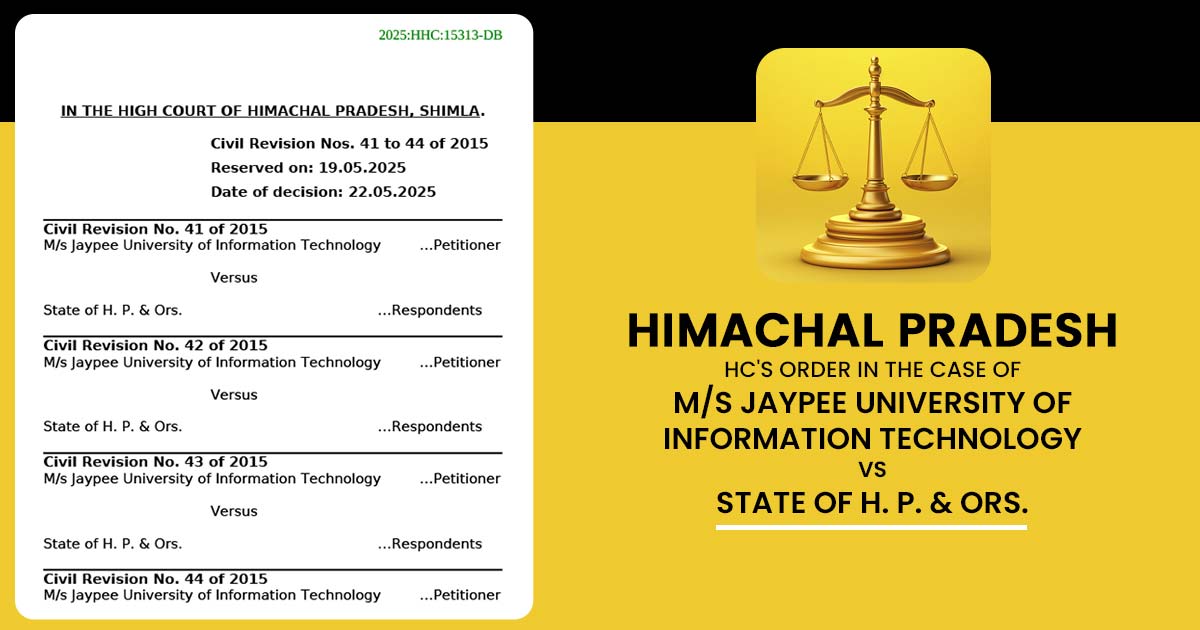
The university must be given a proper chance by the Assessing officer to show its case and can’t take the law into their hand by acting as a Prosecutor, Judge, and Executor at the same time, the Himachal Pradesh High Court ruled.
Justice Tarlok Singh Chauhan & Justice Sushil Kukreja: “The Assessing officer took the law into his own hand and played as a Prosecutor, Judge and Executor at the same time.”
The Case
Established in 2002, Jaypee University of Information Technology is governed by the Jaiprakash Sewa Sansthan, a non-profit trust. The university operates on a non-profit basis, dedicated to offering quality technical education. It is committed to maintaining high standards across its teaching, research, training, and extension programs.
As per Section 10(23C)(vi) of the IT Act, 1961, tax exemption is there to educational institutions that function only for educational purposes and not for profit. Therefore, the said university is exempt from the payment of Income Tax as it is not a for-profit organisation.
Given its secluded location in a Solan District village, the university established an in-house meal facility for its students, as there was no market within a 15-kilometre radius. The facility’s mess had three sections: one for meals, another for snacks and confectionery, and a third for daily necessities like stationery and toiletries. These services were exclusively for students, with no external access, and were not operated for commercial gain.
The Excise & Taxation Department officers on 06.03.2013 visited the university campus and asked for the records of the mess facility along with purchase details, daily receipts, and expenditure accounts. The Department officers levied a tax of ₹38,17,348 on the university.
Claims of the University
Officers asked for instant tax payment without allowing them to demonstrate their case, the university claimed. Failure to do that will seal the whole premise of the university. Therefore, to avoid reputational damage, the university paid the entire amount on the same day.
A receipt for the said amount has been issued by the Excise & Taxation Department, but no assessment order was passed in the case. Thereafter, the university officials asked for the order, but the department denied it, citing that the order shall be issued merely after the lapse of a 60-day appeal period. Harsh action will be taken in the future if the university proceeds with any legal or appellate recourse, they warned.
Read Also: Kerala HC: An Income Tax Assessing Officer Cannot Ignore a Taxpayer’s Claims Without Proper Inquiry
After that, against the demand of the Department university submitted a plea to the HP Tax Tribunal. The university is obligated to file taxes, the tribunal mentioned, specifying that the university is providing foodstuffs and other items within its premises, which was not allowed, as it is primarily for education.
The university, dissatisfied with the tribunal’s order, has submitted the revision petitions in the HC.
Observations
The court said that the Assessing Authority has passed the tax payment order without furnishing the chance to university to be heard and show its case. Citing that the Assistant Excise & Taxation Commissioner acted in an unprofessional and illegal way by fixing the obligation to file the tax on the day of the visit, and did not provide the university a chance to present their case.
The Court stated that “The Assessing officer took the law into his own hand and played as a Prosecutor, Judge and Executor at the same time.”
The court said that in the same case, the canteen facilities furnished via the university do not have a business intent. Thus, the university should not be obligated to file any taxes on these furnished facilities. Legally, it is positioned that no intent is there to earn the profits, u/s 2(15) of the Income Tax Act, 1961, the activity cannot be regarded as trade, commerce, or business.
In Commissioner of Sales Tax v. Sai Publication Fund (2002), it was ruled that “where the main activity is not business, then any incidental or ancillary transactions would normally amount business out if an independent intention to carry on the business in the incidental or ancillary transaction is established. It was further held that the burden to prove such intention rests on the department”.
It was ruled by the court that the main university activity is to provide education; it could not be termed as a business activity. The university has revealed its income and expenses information in its financial records, and the tax demand has been raised without establishing via the department how such incomes were imposed to tax.
Therefore, the court concluded that the canteen establishment via the university shall merely be called a business if an intention to continue the business is established via the excise department.
| Case Title | M/s Jaypee University of Information Technology vs State of H. P. & Ors. |
| Case No. | Civil Revision Nos. 41 to 44 of 2015 |
| For the Petitioner(s) | Mr. Rakesh Kumar |
| For the Respondents | Mr. Anup Rattan, Mr. Ramakant Sharma, Mr. Navlesh Verma |
| HP High Court | Read Order |









